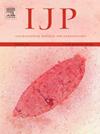Trichinella spiralis excretory/secretory antigens ameliorate porcine epidemic diarrhea virus-induced mucosal damage in porcine intestinal oganoids by alleviating inflammation and promoting tight junction
IF 3.2
2区 医学
Q1 PARASITOLOGY
引用次数: 0
Abstract
Trichinella spiralis and porcine epidemic diarrhea virus (PEDV) are two infectious swine pathogens. Parasite excretory/secretory antigens play critical roles in various disease processes. To explore the coexistence mechanism of two pathogens infecting the same host, the intestinal organoid was utilized to reproduce these biological processes. In this study, we investigated the effects of T. spiralis excretory/secretory antigens (TsES) on PEDV-induced inflammatory regulation, lesion recovery, and mucosal barrier repair in porcine intestinal organoids. The results showed that PEDV effectively infected the porcine intestinal organoids. Next, TsES inhibited pro-inflammatory cytokines and increased the anti-inflammatory cytokines produced by PEDV-infected porcine intestinal organoids. Further, four-dimensional (4D) label-free quantitative proteomics and western blotting confirmed that TsES regulate the inflammation caused by PEDV infection through the nuclear factor kappa-B (NF-κB) pathway. In addition, TsES promoted cell proliferation, inhibited apoptosis, and reduced PEDV-induced lesions in intestinal organoids. The elevated secretory immunoglobulin A (sIgA) levels caused by PEDV infection were downregulated by TsES treatment in intestinal organoids. TsES treatment reversed the mucosal barrier damage caused by PEDV infection in intestinal organoids. Finally, PEDV replication increased after TsES treatment in organoids. We highlight the potential of TsES to ameliorate PEDV-induced inflammation, mucosal lesions, and barrier damage in porcine intestinal organoids. TsES also contribute to PEDV replication. This study presents a novel research model for research on host-virus-parasite interactions, while also providing a theoretical foundation to consider parasite derivatives as a potential adjunctive therapy for intestinal inflammation.

旋毛虫排泄/分泌抗原通过减轻炎症和促进紧密连接改善猪流行性腹泻病毒引起的猪肠类器官粘膜损伤。
旋毛虫和猪流行性腹泻病毒(PEDV)是两种具有传染性的猪病原体。寄生虫排泄/分泌抗原在各种疾病过程中起关键作用。为了探索两种病原体感染同一宿主的共存机制,我们利用肠道类器官来复制这些生物过程。在这项研究中,我们研究了螺旋螺旋体排泄/分泌抗原(tse)对pedv诱导的猪肠道类器官炎症调节、病变恢复和粘膜屏障修复的影响。结果表明,PEDV能有效感染猪肠道类器官。接下来,tse抑制了pedv感染的猪肠道类器官产生的促炎细胞因子,增加了抗炎细胞因子。此外,四维(4D)无标记定量蛋白质组学和western blotting证实,TsES通过核因子κ b (NF-κB)途径调节PEDV感染引起的炎症。此外,tse还能促进细胞增殖,抑制细胞凋亡,减少pedv诱导的肠道类器官病变。感染PEDV引起的分泌性免疫球蛋白A (sIgA)水平升高,经tse治疗后可下调。tse治疗逆转了PEDV感染引起的肠道类器官粘膜屏障损伤。最后,在类器官中,经tse处理后PEDV复制增加。我们强调了tse在改善pedv诱导的炎症、粘膜病变和猪肠道类器官屏障损伤方面的潜力。tse也有助于PEDV的复制。本研究为宿主-病毒-寄生虫相互作用的研究提供了一种新的研究模式,同时也为考虑寄生虫衍生物作为肠道炎症的潜在辅助治疗提供了理论基础。
本文章由计算机程序翻译,如有差异,请以英文原文为准。
求助全文
约1分钟内获得全文
求助全文
来源期刊
CiteScore
8.40
自引率
2.50%
发文量
76
审稿时长
23 days
期刊介绍:
International Journal for Parasitology offers authors the option to sponsor nonsubscriber access to their articles on Elsevier electronic publishing platforms. For more information please view our Sponsored Articles page. The International Journal for Parasitology publishes the results of original research in all aspects of basic and applied parasitology, including all the fields covered by its Specialist Editors, and ranging from parasites and host-parasite relationships of intrinsic biological interest to those of social and economic importance in human and veterinary medicine and agriculture.

 求助内容:
求助内容: 应助结果提醒方式:
应助结果提醒方式:


